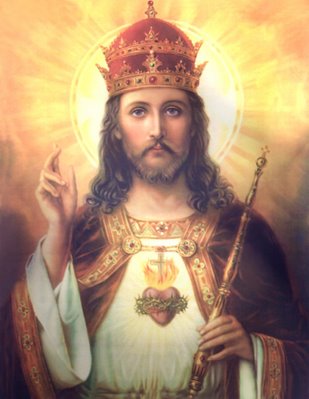Christ the King

Feast of Christ the King
Today’s Readings: Dn 7: 13-14; Ps 93; Rev 1: 5-8; Jn 18: 33-37
Today we celebrate the mass of the last Sunday of the liturgical year. Back in 1925, Pope Pius XI established that this final Sunday of the Church calendar would be a special feast day: the Feast of Christ the King. The purpose of today’s solemnity is to remind us of the ancient idea that Christ is the divine King who sits on his throne at the right hand of the Father and who will return at the end of time in might and majesty.
For us Americans, the idea of having a king over us is a little hard to grasp. We’re more familiar with the principles of democracy. We elect our leaders and ultimately, we get rid of them if we don’t like how they govern. That’s not how it works with a king. He has all the chips, all the power.
Because of this, kingship is a rather scary concept. Doesn’t it make you nervous that so much control and authority is concentrated in one person’s hands? People can get drunk on power. Henry Kissinger called it the ultimate aphrodisiac. And most of us have heard Lord Acton’s famous dictum: “Power tends to corrupt, and absolute power corrupts absolutely. Great men are almost always bad men.”
But what if our king weren’t like that at all? What if his goodness towards his subjects, and his love for them, were unquestionable? What if there were no danger that he’d go off on an ego trip, or change his mind or his loyalties on a whim, or have new best friends every week? Now we’re getting closer to the idea of Christ the King.
Yes, his power and authority are absolute... but he wields this power with mercy, compassion, patience and profound love.
I think for many of us, God is way far away. The theological word is “transcendent.” Maybe you picture him like a puppeteer pulling the world’s strings… someone we can’t see but who we could try rather pathetically to pray to for favors as if he were the Great and Terrible Oz.
But the Church reminds us that he’s also right here among us… or to use another five-dollar word from theology, he’s “immanent.” I have often reflected with amazement that God knows me. God knows you. God knows everything about us. He knows when we sit or stand. He knows what we’re going to say even before we know. He actually knows us better than we know ourselves. God does hear our prayers and cares deeply for us. He knows our deepest secrets. In fact, God has known absolutely everything about us, going back even before our conception and birth.
I know many of us can’t help but think that we’d be unlovable to anyone who knows us quite that intimately and thoroughly. But guess what? God does love us. He wants us to pray and ask for things we need or want. He wants us to share our hopes and dreams with him. Oh yes, we can be assured that God cares. God sees. He stops, looks and listens to our cries. It is wonderful to be with God.
In one of my previous parish assignments, we had a parishioner who was quite a successful businessman. He was a self-made millionaire. He was polished and well-spoken. And despite the fact that he was a generous man and a respected employer, some people were intimidated and afraid of him… even suspicious of his motives.
One time, he invited me to his house for dinner. His mother was in visiting from out of state. She was the opposite of him. While he was polished and debonair, she spoke with a heavy foreign accent, wore the clothes and hair of a poor immigrant, and didn’t hesitate to pick her teeth at the table. And you could see that he absolutely adored her. He doted on her, and she loved every bit of it… not because he was Mister Fancy Pants, but because this was her darling son who liked treating his mother like a queen.
And from that day on, whenever anyone would make some remark about this man’s character, I would remember my experience and could say, “No. He is a good and kind man.”
This fellow saw his mother as a gift. And you know what? We shouldn’t forget that despite the shortcomings we may see in ourselves, we are very much a gift to God!
It’s often hard to believe that God wants to be known by us, but it’s true. He wants nothing more than to have a wonderful two-way relationship with us that’s personal and intimate. He wants to love us, and he wants us to love him back.
If you’ve been hurt by the Church in the past, then realize that it’s people, not God, who are the abusers. God will never refuse, reject, denigrate or ridicule you. So maybe it’s time to find the courage to take a risk with God. Spend some leisure time together. Think of the beautiful words of Hosea the prophet: “I don’t want your sacrifices; I want your love. I don’t want your offerings; I want you to know me.”
And that, my friends, is Christ our King. Don’t be afraid of him or be angry at him or think you don’t need him in your life. What a terrible loss—for both of you! No, let him love you and draw you closer to him a day at a time. Let him be your king. Amen.


